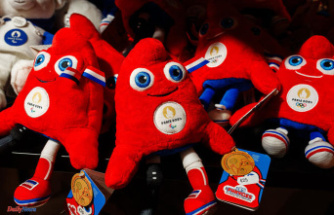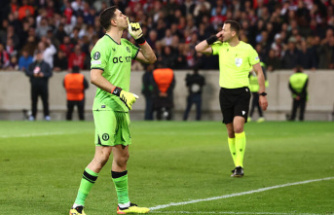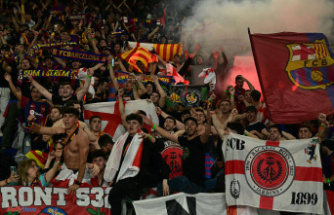Tennis maestro, king of Wimbledon, doyen: Roger Federer caresses the yellow felt ball like no other, plays a forehand to fall in love with and becomes the greatest artist of all time on the lawn. Now an era is ending - but Federer's magic lives on.
In fact, everyone has the same opportunities. Actually. The tennis court has an area of about 195 square meters, a net divides the court in two halves. In addition, each of the two players gets a racket, there is a ball and the same rules for everyone involved. And yet, from the moment Roger Federer plays his first professional tournament in Gstaad in 1998, everything seems to change. Suddenly one of the players on the pitch is no longer subject to physical laws. Federer seems to possess almost inhuman advantages compared to his opponents. The 24 years full of magic, dominance, leaps of joy and tears are now over: the tennis maestro ended his unique career after the Laver Cup on September 25 at the age of 41.
As Federer takes off, onlookers realize that this ponytailed young talent interprets the game of tennis differently than anyone before him. Some already did at the Wimbledon tournament in 2001, when the 19-year-old Swiss met his idol, the seven-time title holder Pete Sampras, in the round of 16 and defeated the American in five sets, ending Sampras' series of 31 consecutive wins in London. Everyone else at the latest at Federer's first Grand Slam title in 2003 in Wimbledon.
The nickname "Maestro" soon caught on. Because Federer is the ultimate esthete. How he moves, or rather: slides across the court. How he hits the ball, or rather how he caresses it tenderly. This is poetry in motion. The one-handed, whipping backhand, the perfection of the forehand that will make even the toughest go weak in the knees, and of the serve, volleys from other galaxies at the net. For many, Federer no longer plays tennis during his career. He builds works of art. At one point he even admits that in his earlier years he sometimes chose the "prettier shot" rather than the more effective one. Spectators speak of a "religious experience" when they see the master live.
Whole books are written about the aesthetics of the maestro on the pitch. The late writer and tennis fan David Foster Wallace describes his admiration for the Swiss in his essay "Federer Made Flesh and Not" so that nothing more needs to be added: "Federer's forehand is a terrific liquid whip and his one-handed backhand he can flatten , topspin or slice - with so much backspin that the ball rotates in the air and only slides ankle-high when it hits the ground."
But of course Federer is not a larifari beauty player. On the contrary: on the field he is a killer with a toolbox full of torture objects for his opponents. His forehand has long been arguably the most dangerous weapon in tennis and one of the most visually appealing experiences of all. The variety of shots he masters and his incredible technical ability are both admirable and menacing to his opponent. Fans watch her wide-eyed and jaw dropped. Again and again. Over decades. It's hard to believe that this is now the end of it.
Likewise, books about Federer's mental strength could be written. They may even have already been written. Because the Swiss are always at their strongest when they have to deliver and almost never show nerves. His famous self-admonition "Chum now!" then follows after the important point. You will miss the spectators as much as Federer's fairness and generosity. If he was still wild at the beginning of his career and even smashed clubs, the Swiss later became the figurehead of a "decent" professional.
Federer flies to every place on earth, whether on grass or ash, to the love of the fans, which annoys some competitors. Whether he wins is only a minor matter for the viewers at some point. Federer is more than a tennis player. An icon. A figure of light. A symbol. Not just tennis, because after his first great successes, the professional mutates into a representative of sport in general and a representative of humanistic values.
In addition to all his successes, Federer's career is also peppered with dramatic and bitter defeats. At first, he was even talked about a Grand Slam blockade, which every tennis fan can only smile about today. But especially in the duels with his two big adversaries, Rafael Nadal and Novak Djokovic, the Swiss repeatedly provides superhuman moments as well as painful failures. The 2019 final defeat in Wimbledon against Djokovic is remembered, for example, when Federer is only one point away from the ninth title on Church Road twice on his own serve. It is, as some suspected at the time, his last chance for a major title. But these defeats show the human side of Federer, who always congratulates in a collegial and chivalrous manner. Moments like this only increase fans' affection for the maestro, as they see that the artist isn't a supernatural magician after all, but flesh and blood.
But mostly the magician wins. Sometimes with poetry, sometimes with power. Sometimes with tenderly stroked stop balls, sometimes with murderous forehand winners. Always with full commitment, over 24 years. 20 Grand Slam titles (which was long considered impossible), eight wins in Wimbledon (record!), 310 weeks at the top of the world rankings (the record number of 237 weeks in a row), 103 individual titles, five times World Athlete of the Year (as often like no other), won all four Grand Slam tournaments (only seven other players managed).
Whether he's the greatest tennis player in history, that discussion is moot. All the successes, they cannot describe what Federer has done on the court and for tennis. What emotions his tennis poetry triggered in fans, how he made people marvel, cheer and cry. All that remains in the millions of hearts. Forever. No other player represents tennis like Roger Federer. While Nadal is too introverted and teases Djokovic with scandals, the Swiss are the urbane gentleman, before whose magic and caution next to the court everyone bows.
Now the magician with the yellow felt ball, perhaps the greatest artist in tennis, says goodbye. It's the end of an era. He posts a message on Twitter and tells how the "Swiss ball boy fulfilled all his dreams". Finally, the maestro addresses his words to the tennis game again: "I love you," he says, "and will never leave you." Neither does Roger Federer.












